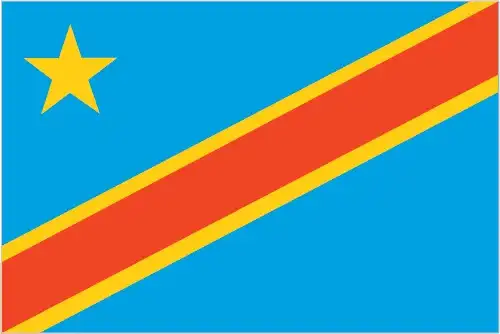Congo Flag
National Flag of Congo
Congo Flag Display

Quick Facts About Congo and Congo Flag
- Adopted:
- Aspect Ratio:
- 2:3
- Capital:
- Brazzaville
- Population:
- 5.8 million
Flag Description
The flag of the Republic of the Congo features a diagonal tricolor of green, yellow, and red, with the green and red bands separated by a yellow diagonal stripe. The green represents the forests and agriculture, yellow symbolizes the friendship and nobility of the people, and red represents the struggle for independence and the blood shed for freedom.
Symbolism & Meaning of the Congo Flag
Green for forests and agriculture, yellow for friendship and nobility, red for independence struggle and freedom.
Historical Background of the Congo Flag
Adopted in 1959, the flag was replaced during the socialist period (1970-1991) and restored in 1991 after the fall of the socialist government. The design is inspired by the Pan-African colors and represents the country's natural resources and independence movement.
Design Elements of the Congo Flag
Diagonal tricolor (green-yellow-red), yellow diagonal stripe separating green and red bands.
Usage & Protocol of the Congo Flag
Flown on government buildings and during national celebrations. The flag represents the country's natural wealth and independence struggle. Displayed during official ceremonies and international events. Must be properly maintained and treated with respect.
Frequently Asked Questions
What do the colors of the Congo Flag represent?
Green for forests and agriculture, yellow for friendship and nobility, red for independence struggle and freedom.
When was the Congo Flag adopted?
The Congo flag was adopted on 1959 (restored 1991), marking an important milestone in the country's development as an independent nation.
What is the aspect ratio of the Congo Flag?
The Congo flag has an aspect ratio of 2:3, which determines the proportional relationship between its width and height for official display purposes.